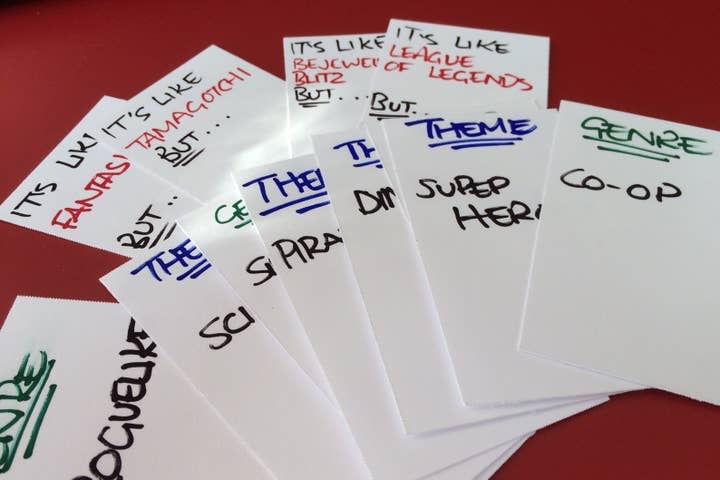Elevator Pitch: A Game to Make You More Creative
Will Luton's card game for developers who need fresh ideas
When I was a starting out on my career as a game designer I thought ideas were cheap. You sat down and thought real hard and an game concept would just pop out of your brain. And so I would sit and think and game concepts would pop out. Easy. The problem was, in retrospect, these ideas weren't any good; they were heavily derivative, inelegant and what today I would consider lazy.
The truth of creativity is that ideas are indeed cheap. You can produce lots of them very quickly. However, you can't control the quality. Most ideas will be bad ideas, but some will be okay. The okay ones you can iterate upon with more ideas and in the very odd occasion turn them in to great ideas.
You'll only ever get to great ideas by first creating a whole bunch of bad ones. It simply cannot be circumvented. And that's where most people become stuck at being good creatives: They generate a couple of ideas from what is currently in the forefront of their mind, look at them and think "this sucks, I suck, I'm not creative" then feel dejected.
Good creatives however work hard at searching the endless junk in the recesses of their brain, getting ever deeper and mashing bits together to create ideas that are unexpected.
Now the chances are if you're reading this your brain is filled with all the junk required to have a billion dollar good game idea. You have memories of cartoon, that time you made a catapult, the day you went to the zoo and your childhood building blocks. It's all up in your head, gathering dust.
However, dragging that stuff out and making it fit together isn't easy. Firstly is because your brain keeps your subconscious locked away so you don't go off on rambling tangents about catapulting birds at pigs. You are almost all the time, and quiet rightly so, thinking vertically: That is to say you are thinking singularly and in steps to get stuff done.
Secondly, humans are hard-wired to worry about their reputation, so naturally avoid making what seem like bad suggestions (catapulting birds at pigs). Combined with vertical mode thinking this anxiety is something that cripples and frustrates the concept generation process.
To tackle this creativity problem I have designed a card game which I'm loathed to call a team building exercise: Elevator Pitch. The intention of Elevator Pitch is not to generate game concepts but instead to make everyone better at generating game concepts by overcoming their reluctance and to start digging their mind to produce unexpected solutions.
The game works by having players come up with an elevator pitch for a concept limited by three cards, then the players all vote on which pitch was "best". Generally "best" means which one was the most ridiculous, but sometimes which actually seemed like it would be a fun game.
Setup
- Download and print this PDF.
- Decide on games you would have liked to have made and write them on to the game cards (those that say “It's a bit like…”).
- Do the same with the theme and genre cards. Theme might be “zombies” or “war” whilst genre would be “FPS” or “Simulator”.
- Cut the cards and create two shuffled decks, one deck containing all the game cards and another contain all the theme and genre cards.
- Deal out the theme and genre cards equally to all players.
- Place the game cards deck face down.
Play
- Turn over the top game card. This will be the basis for all pitches.
- Players choose two card from their hand (consisting of theme and genre cards), revealing one to their left and one to the right.
- Players have 30 seconds to think of a pitch based on the game and theme and genre cards they have. Note: players may not have one each of a theme and genre card, but instead two of the same type. This is fine.
- One player volunteers to pitch first starting with “It's a bit like…” adhering to both the theme and genre cards they were passed.
- This then follows clockwise until all players have pitched.
- Once every player has pitched the group decide which game is best by a vote. In the event of a tie the tied players debate, defending their idea before a revote.
- The winning player gains that game card for score keeping, the passed theme and genre cards are discarded then the round repeats. If the players' hands are depleted at any time, shuffle and deal again all discarded cards.
- The player with the most game cards once all game cards have been revealed wins the game.
It's worth restating that the point of this game is not about generating concepts themselves, but is intended to exercise the creative process of concept generation whilst creating a fun environment where silly ideas are encouraged. If people are laughing whilst doing this, you're doing it right.
Running this a few times with teams has lead to great dividends in brainstorming. Staff feel more relaxed, willing to participate and offer up ideas, if only for the benefit of amusement. Indeed keeping a focused, but light hearted environment during not just concept creation but all group problem solving is valuable in generating lateral thinking that creates unique and fun games.
